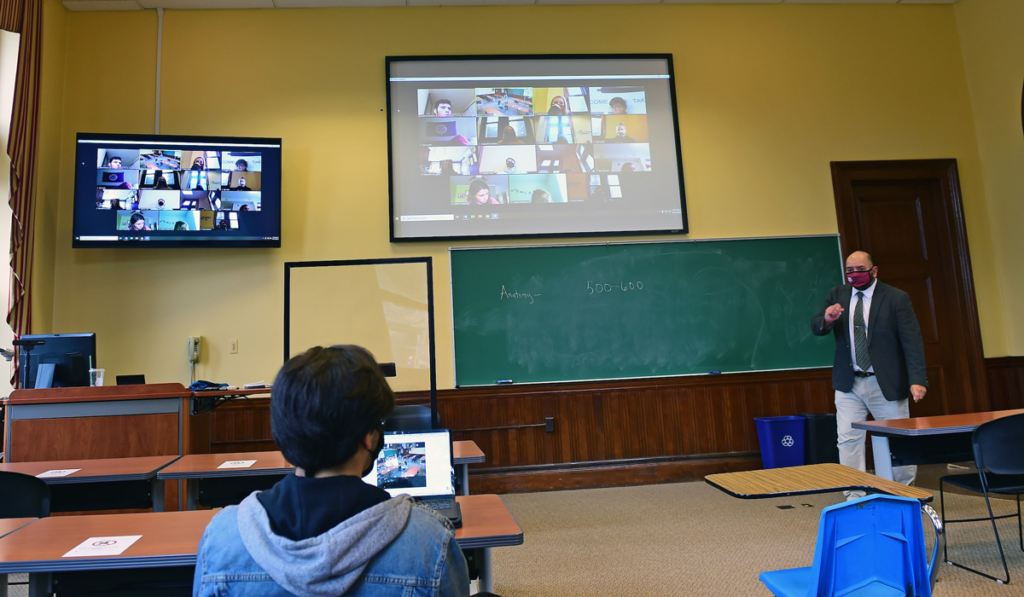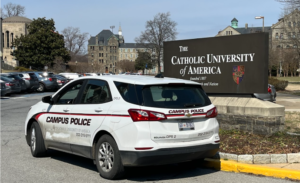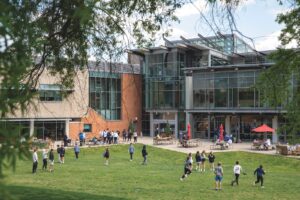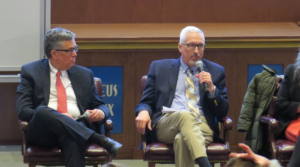SGA Urges Professors to Reconsider “Willingness” for In-person Classes This Spring, Sparking Debate Among Students and Senators

Image courtesy of Catholic U Communications
by Shannon Rose Miekka
On Monday, November 2, the Student Government Association published a letter addressed to the faculty and professors of Catholic University, urging “non-exempt professors” to return for in-person instruction in the spring.
Recent discussions with students and with members of the faculty have given us cause for concern regarding the willingness of the faculty to return to in-person instruction next semester contrasted with student determination to learn on campus.
In our role as the bridge between the students and the faculty of the University, it is our duty to convey the strains of remote learning that our student body has experienced during the Spring 2020 and Fall 2020 semesters.
The letter advocates on behalf of the students who want in-person instruction, but it comes despite uncertainty of whether more people will even be allowed to return this spring. The administration has yet to release their final decision, and it is still subject to change come January.
Let us be absolutely clear- we have no intention of suggesting any course of action that places undue risk upon you, the faculty and professors. In the cases of professors who are immunocompromised, of extreme old age, or at otherwise heightened risk of infection, we understand the need to continue online methods of instruction.
That being said, we urge all non exempt professors to return for in-person instruction in the spring. We believe the academic and emotional toll witnessed by students, combined with the considerable safety measures instituted by the University, offer a compelling argument for this course of action. We consider it a disservice to our academic careers to not take advantage of the opportunity to return safely to the classroom. We offer this opinion not of our own convictions, but through numerous conversations and office hours with members of the student body.
Several students took to the comments, and the response was starkly divided.
Students who support the letter feel represented and appreciate that it gives students and faculty the choice to return to campus rather than repeating last fall.
“Thanks a lot SGA!!” commented user @jtparker. “I know myself and many other students are hopeful for the possibility of in-person classes! Thank you for encouraging our professors to come back to in-person classes if they feel comfortable given the universities aggressive restrictions. I am thankful that SGA took time to acknowledge the difficult spiritual and mental impact online classes can have on the person.”
“I look forward to being able to finish out my Catholic U career in the classroom,” senior Erica Farrell commented. “Thanks for advocating SGA!”
The letter also detailed the university’s safety protocol, and several students expressed trust in the measures taken.
With enforced social distancing, mandated masks, plexiglass shields to lecture behind, and more, we cannot think of a safer place on campus to congregate.
“Seeing as cases are extremely low on campus, and we have demonstrated that we are a university community devoted to taking proper precautions in respect to one another’s health – I think this is undoubtedly a step in the right direction,” commented @carolssszzz.
On the flipside, several students disagreed with the letter’s sentiment, saying that it puts unnecessary pressure on faculty to return and does not represent the majority of students.
“You did not ask the input of any students and it is clear that you didn’t ask other members of SGA for their input either,” wrote user @kathleen_e99. “While I’m sure many students would agree that they would like to have classes in person and be able to see their professors, professors should NOT be pressured like this to return. Professors who are not exempt may have a number of other reasons as to why they do not wish to return and we need to respect that.”
Another controversy in the comments came from inside SGA, who claimed that they were left in the dark about the letter, despite it being signed by the Student Government Association.
“Regardless of individual opinions on the content of the letter, to imply that all those involved in SGA had any knowledge of or involvement in its creation by signing it simply ‘The Student Government Association’ is disingenuous at best and patently false at worst,” Class of 2021 Senator Ally Kilgore commented. “Once again disappointed by an administration that has repeatedly laid claim to transparency.”
The dispute in the comments spread to SGA’s meeting on Monday night, which several students joined via Zoom in order to speak during the Student Comments segment.
“I understand that SGA does not actually make the decision who will return to campus and of course is not forcing any professors to come back to campus,” Sam McGrath said. “But to say that all the students or a large number are demanding that the professors risk their lives for our benefit is just inaccurate, and was upsetting for me to see that that’s how we’re being represented to professors right now.”
“This is unfortunately not a reflection of my thoughts and feelings as a student,” Regina Brennan commented. “I would not encourage faculty & students to come back when they don’t feel safe, regardless of their demographics. i would not further classify that as a ‘disservice.’ and i hope that what has been said can be reconsidered.”
During the meeting that night, Brennan continued: “Is it a disservice to put public health, safety, family, and security first?” In my opinion, the professors have stepped up and it is the students who have clearly dropped the ball.”
Referencing the number of students on and off campus who have not followed social distancing protocol, Brennan asked, “Are you willing to make the real sacrifices that would truly make it a safe classroom? Plexiglass and masks are not enough.”
Matthew Ziegler, a junior nursing major, voiced support for the letter and argued that certain majors, like nursing, are at a loss without in-person instruction.
“Online learning is absolutely detrimental to my career,” Ziegler said. “[The professors] are doing the best they can, but the reality is, I’m losing the kinesthetic learning that I need in order to actually properly care for the patients I’m going to see in the future… I could potentially kill someone from a lack of knowledge from kinesthetic learning. I don’t know how to properly give a shot right now.”
Sophomore history major Daniel Madden had never felt the urge to participate in student government until he read Monday’s letter.
“For months, my peers and I have suffered under the repressive and mind-numbing system of online learning,” Madden said. He claimed that some of his professors have openly called to return to in-person instruction.
“As to the notion that the student body is being unfair and selfish to the professors by asking them to return to campus: we are simply demanding what our tuition covers,” Madden continued. “The fact of the matter is… these individuals work for us and as such we have a right to ask that they do their jobs accordingly.”
After Student Comments, SGA President Gerald Sharpe delivered a statement on Monday night addressing the responses to the letter.
“Since May 1st SGA has advocated for the university opening as safely as possible, while ensuring that students who don’t feel comfortable are able to continue with online methods of instruction,” Sharpe said.
“This letter was simply restating SGA’s advocacy work during the past nine months, and just redirecting it towards professors, who now have the ability to choose which modality their class will be in. This letter was certainly not a change in course or a change in our strategy; it’s what we’ve been saying all along.”
“The facts speak for themselves: this campus is safe,” Sharpe continued, attesting to the University’s safety measures. “I have seen firsthand the incredible work the university has put in to ensure the campus and its classrooms are among the safest places in the district.”
“For those students who opposed the letter… and professors who don’t feel comfortable returning, that’s okay,” Sharpe said. “You certainly have the option not to come back next semester. This letter is not a mandate, it’s a mere suggestion and encouragement from SGA.”
The senators’ confusion continued beyond social media and was thoroughly discussed during Monday night’s meeting.
“As a senator in this body for four years, I really have no choice but to comment on the deeply unprofessional way to which this letter was promulgated,” Kilgore said.
The Executive Board presented the letter to the Academic Senate—composed of the nine deans, some professors, and President Garvey— before the remainder of SGA was made aware.
“When SGA brought this letter to the Academic Senate… it was very well received,” Sharpe said.
Benjamin T. Rome School of Music Senator Cecilia Bracey also said that her issues with the letter were not about the content, but how it was given to the students.
“The executive being upset with senators who commented and spoke out against it, I think was inappropriate,” Senator Bracey said. “I think that senators should be able to speak out against the executive if that’s what they feel they should do.”
“This letter, by not being shared with the senators until eleven days after it was sent to the Academic Senate, disregards the role of senators as representatives of their constituents’ concerns,” remarked School of Arts and Sciences Senator Allison Sijgers.
On the subject of transparency, Sharpe said that the Senate was informed in an email last week of SGA’s push for capable professors to return for in-person classes.
“Having heard no objections to the letter, we proceeded to publicize it on our social media pages four days later in an effort to keep the undergraduate up-to-date on our work,” Sharpe said.
“I understand that senators could have responded to the email, but it wasn’t evident in the tone and the way it was sent that the option was available to us,” Kilgore said in response to Sharpe’s statement.
“We did get that in an email, but it had already been sent to the academic senate,” Bracey said. “So for my understanding, anything I had to say about it was null and void at that point.”
“I agree that the executive did not break any laws,” said School of Philosophy Senator Melissa Zentz. “What they did was fully in their ability, and I think they should have that ability to reach these concerns that have been brought up in multiple town halls [and] office hours.”
“We all know that this is something that the students want to be advocated for,” Zentz continued. “Whether I agree with it or not, we know that this is a concern of the students. That being said, I would fully agree that this is the time to make legislation changes looking towards the future.”
While some senators proposed a change in the by-laws concerning the Executive Board (and whether future statements should be signed by the entirety of SGA), others wanted it to be clear that they did not have issues with either the content of the letter or how it was promulgated.
“I just want to put it out there, I agree with the content of the letter. I agree in the way that it was presented,” said Class of 2023 Senator Maura Schlee.
“I fully support the safe and cautious return to school,” said Benjamin T. Rome School of Music Senator Will Lucardi. “I think it’s incredibly inaccurate to describe the letter as selfish or irreflective of the students’ wishes.”
Based on the divided response, it is unclear whether the majority of students are in favor of returning to in-person instruction this spring. We do know that 578 students responded to the Spring Housing Interest survey, but it is unknown whether most students agree with urging professors to return as well.
“It’s been made clear in this meeting tonight, on social media, and in dozens of our conversations of students that this [returning to campus] is the preferred course of action,” Sharpe said. “We will continue doing our job to ensure that every student’s voice is heard, and that the undergraduates have the most fruitful educational experience possible.”





